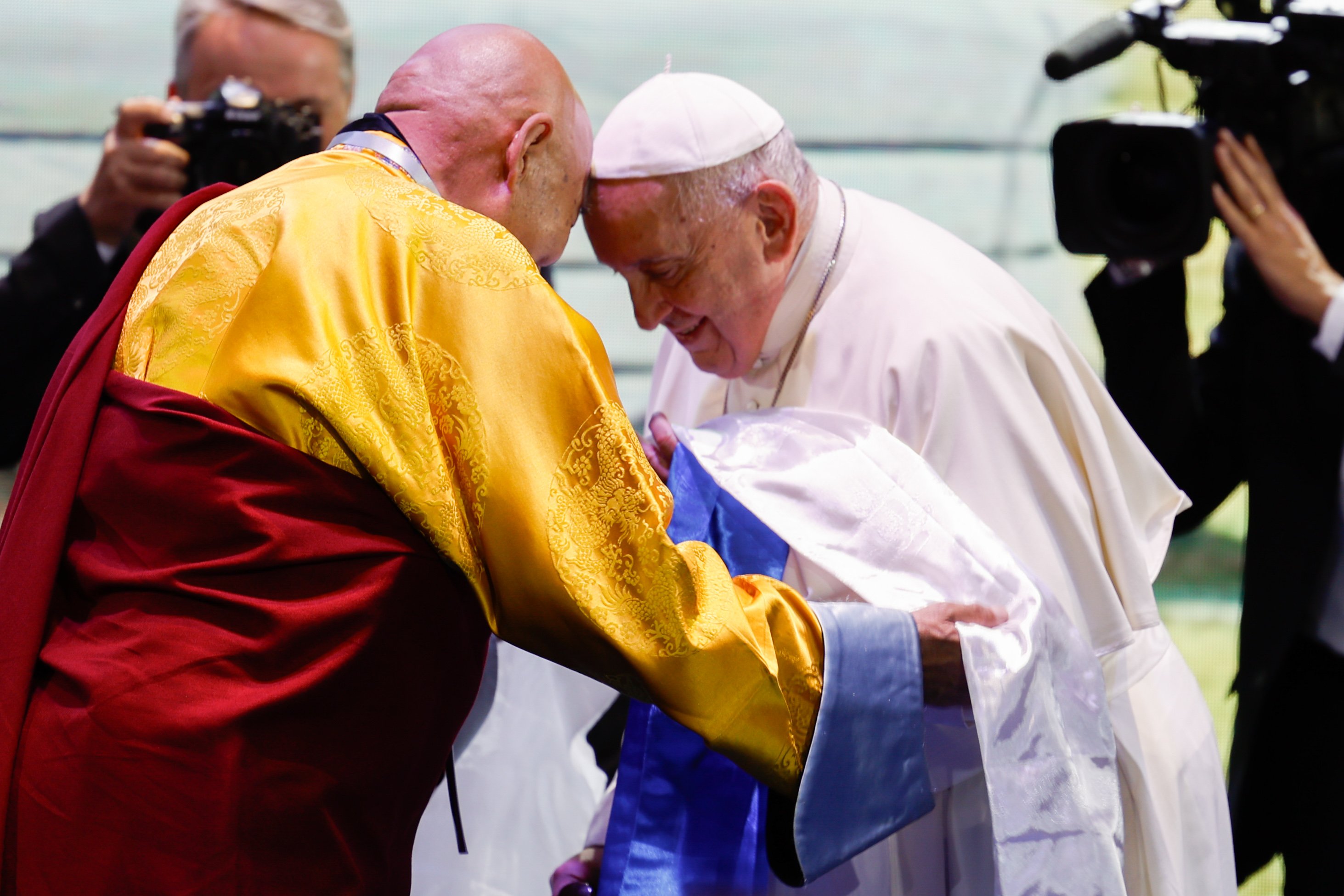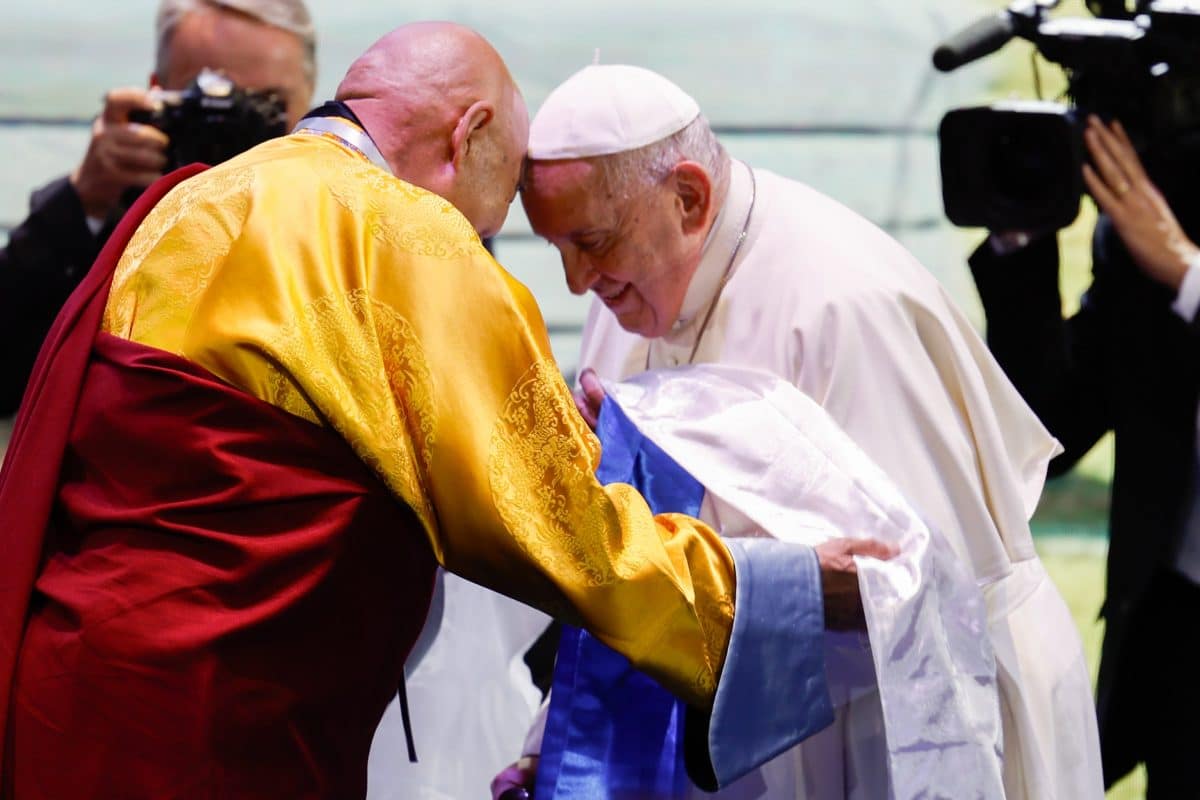
Less than a month ago, Pope Francis made global headlines for a Mass in Portugal that attracted a crowd of over 1.5 million attendees. Here in Mongolia, on Sept. 3, the pontiff turned his attention to a local church that boasts fewer than 1,500 Catholics in the entire country.
« I thank God for you, since, through you, he loves to use what is little to achieve great things, » Pope Francis told one of the world’s smallest and newest Catholic communities at the conclusion of Mongolia’s first ever papal Mass.
« Go forward, gently and without fear, conscious of the closeness and the encouragement of the entire church, and above all the tender gaze of the Lord, who forgets no one and looks with love upon each of his children, » the pope heeded.
« Mongolia is a nomadic country, full of farmland, and Pope Francis is like a shepherd pastoring his sheep, » said Shirin Pang before the Mass began. « He’s looking after each one of them, even if there are so few Catholics. »
Pang had traveled from her homeland of Singapore to help volunteer for the papal events here in Mongolia after first visiting the country earlier this summer.
« I heard the pope was coming, and I just wanted to help out, » she told NCR, noting that she was struck by how unique the Catholic Church is here.
« At home, if you don’t arrive at Mass early, you won’t get a seat, » she said. « Here, the church is just beginning to grow. »
And for that reason, the 86-year-old Francis — who over five decades ago hoped to be a Jesuit missionary in Japan — has undertaken his 12th visit to Asia of his decade-long papacy in an effort to bolster a church still in its infancy.
« Our church is in that phase typical of children who constantly ask their parents questions, » Mongolian pastoral worker Rufina Chamingerel told the pope on Sept. 2 during a meeting with the country’s priests and missionaries.
When the first Catholic missionaries arrived here in 1992, the country was just emerging from nearly a century of Soviet rule, where religious practice was prohibited. Just over 30 years later, the faith is slowly being reborn in Mongolia, which now boasts two native-born priests and even the world’s youngest Catholic cardinal, 49-year-old Giorgio Marengo.
« Catholicism has basically totally moved from the West to the East, » Pang observed. « The people in Asia really have a heart for God. »
Advertisement
That reality was on display in the Steppe Arena, an ice hockey rink where amid the smell of both popcorn and incense, some 2,000 Catholics from South Korea, Vietnam, Hong Kong and even neighboring China — defying efforts by authorities to forbid Chinese faithful from participating in the pope’s visit — joined the local Mongolian faithful for the Mass.
« We wouldn’t be this close, even if we were to go to the Vatican, » said 35-year-old Gazelle Hernandez, who moved to Mongolia from the Philippines three years ago.
Reflecting on what it’s like going from one of the world’s most populous Catholic countries to one of its smallest, Hernandez told NCR that it makes the faith feel more personal.
« I get to be closer to people, because I know them all, » she said.
Her Mongolian parish member concurred.
« I can’t believe the pope is here, and I get to see the pope in my own eyes, in my own country, » said 22-year-old Ouyummaa Enkhtuvshin, who attended the Mass with her parents and three siblings.
Enkhtuvshin said that unlike many Mongolian Catholics, she was born into a Catholic family, which she said made it « easier to pick up the ideas and values » of the faith than it is for many Mongolians.
Another Mass goer, Henri de Solages, who moved here from France two decades ago and now has two children with his Mongolian wife, acknowledged that Catholicism remains foreign for many Mongolians, noting that many Catholics did not know what the pope even looked like until the papal visit was announced.
« But we are all still happy to be here, » he said.
Yet despite the somewhat unconventional circumstances of both the visit and the faith in the country, Francis used his homily to link the Mongolian church with the universal church.
« All of us are ‘God’s nomads,’ pilgrims in search of happiness, wayfarers thirsting for love,' » the pope told them.
At the conclusion of the Mass, the pope went on to offer a special, unscripted acknowledgment of the Chinese Catholics in attendance, thanking them for their attendance and asking them to be both « good Christians and good citizens » — an apparent reference to the government’s ongoing crackdown against religious believers in the country.
Earlier in the day, Francis began his morning with what was described by local leaders as a « historical » encounter with the country’s interreligious leaders, where the pope shared the stage with representatives from a dozen other traditions.
Francis — who has consistently prioritized interfaith dialogue in his papacy, and especially during his travels — told those gathered that it was incumbent upon religious leaders to choose fraternity over fundamentalism.
« We are called to testify to the teachings we profess by the way we act; we must not contradict them and thus become a cause of scandal, » said the pope, in a speech that included quotes from Buddha, Mahatma Gandhi and Jesus Christ.
« There can be no mixing, then, of religious beliefs and violence, of holiness and oppression, of religious traditions and sectarianism, » the pope said.
Among those joining Francis on stage were representatives from the Russian Orthodox Church, Judaism, Buddhism, Hinduism, Islam, Shintoism, the Church of Jesus Christ of Latter-Day Saints and an evangelical pastor.
While over 40% of the Mongolia population identifies as non-believers, the country has a long tradition of religious tolerance, dating back to its 13th century founder Genghis Khan.
Ahead of the pope’s arrival here, Mahinda Deegalle, a professor at Bath Spa University in the United Kingdom and an expert in Buddhism, told NCR that many Buddhists — which make up 53% of the population of Mongolia — consider Francis to be « a living saint. »
In particular, said Deegalle, Francis had prioritized dialogue with Buddhists more than any other pope since the Second Vatican Council, adding that he believes this visit to Mongolia will be remembered for opening up a « new phase of interfaith dialogue. »
« Dialogue, the pope told the diverse leaders, is not antithetical to proclamation. It does not gloss over differences, but helps us to understand them, to preserve them in their distinctiveness and to discuss them openly. »
On Sept. 4, prior to departing Mongolia, Francis will visit a shelter that provides healthcare and social services for homeless individuals and victims of violence. The center, known as « The House of Mercy, » is operated by the Catholic Church here and is open to people of all faiths and none.
Afterwards, the pope will board an 11.5 hour flight back to Rome, where an in flight press conference is expected.
